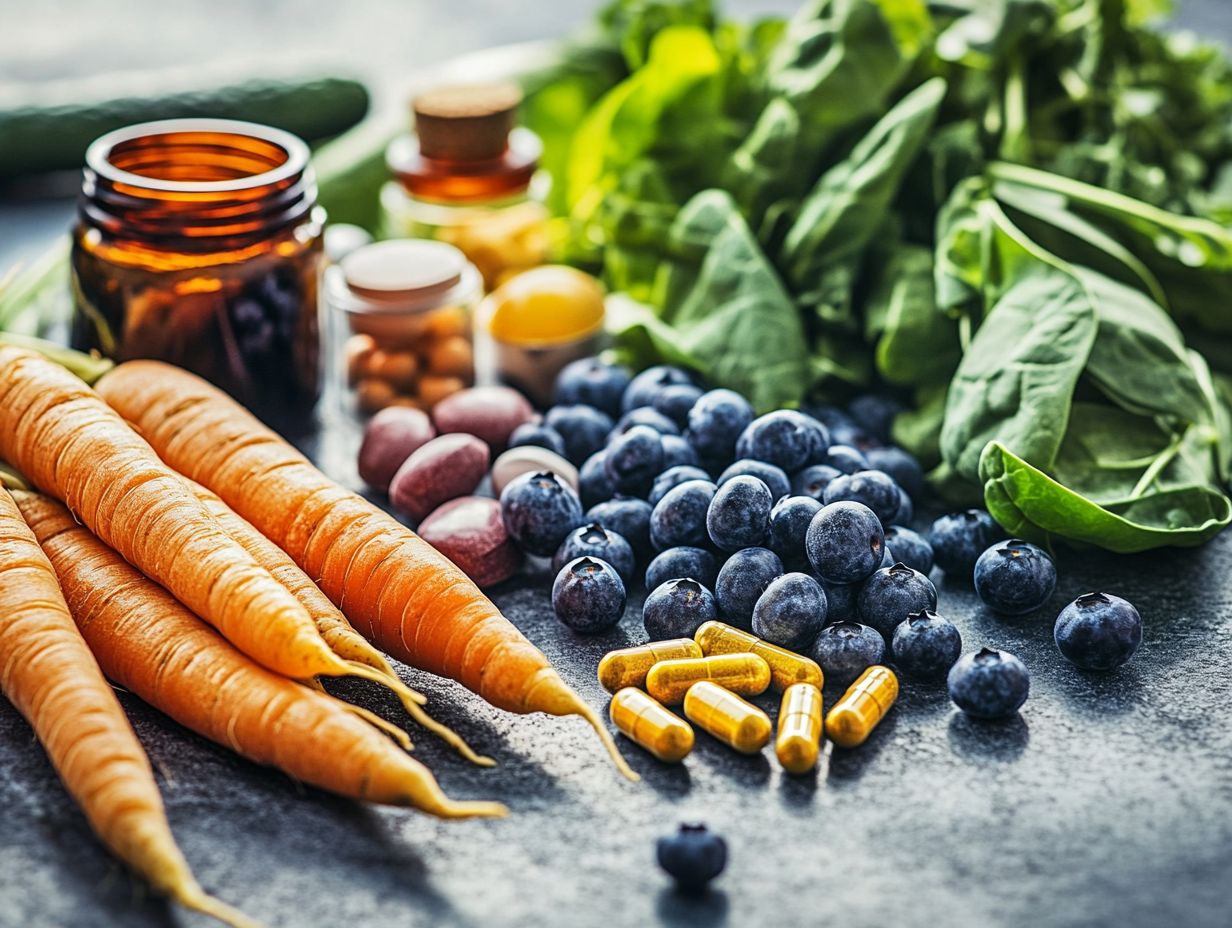The Benefits of Antioxidants in Dietary Supplements
Antioxidants are essential for maintaining your health, but what exactly are they, and how do they function?
This article delves into the captivating realm of antioxidants. Get ready to uncover the amazing types found in supplements and learn how they protect your body from harmful free radicals while promoting overall well-being.
You ll explore their benefits for your immune system, their role in preventing chronic diseases, and their impact on skin health. You’ll also discover easy ways to add these powerful compounds to your diet for better health.
Contents
- Key Takeaways:
- Understanding Antioxidants
- The Role of Antioxidants in Our Bodies
- Types of Antioxidants
- The Benefits of Antioxidants in Dietary Supplements
- Incorporating Antioxidants into Your Diet
- Frequently Asked Questions
- What are antioxidants and why are they important in dietary supplements?
- What are some common antioxidants found in dietary supplements?
- How do antioxidants benefit our health?
- Are there any specific populations that can benefit from taking antioxidants in dietary supplements?
- What are some potential risks of taking too many antioxidants in dietary supplements?
- Can I get enough antioxidants from my diet alone, or do I need to supplement?
Key Takeaways:

- Act now boost your immune system and protect your health with the right antioxidant-rich foods!
- Antioxidants found in dietary supplements play a crucial role in protecting our bodies against free radicals and supporting overall health.
- Choosing the right supplements and incorporating antioxidant-rich foods into our diets can provide numerous benefits for our overall health and well-being.
Understanding Antioxidants
Get excited about antioxidants! They are crucial for combatting oxidative stress and protecting your health. These remarkable compounds, plentiful in fruits, vegetables, and even in supplements such as vitamin C and vitamin E, work diligently to neutralize the harmful effects free radicals can impose on your cells.
Additionally, antioxidants can be sourced from nutrient-dense plant-based foods, making them a key element in dietary guidelines designed to enhance health and prevent chronic diseases.
What are Antioxidants?
Antioxidants are natural compounds that help neutralize free radicals, which can cause cell damage. They work to stabilize these unstable elements, effectively preventing them from wreaking havoc on your cells.
You can find antioxidants in a variety of foods, from vibrant fruits and vegetables to wholesome nuts and grains. Notable examples include:
- Vitamin C, typically found in citrus fruits, which aids in tissue repair and boosts your immune system.
- Vitamin E, present in nuts and seeds, which acts as a protective barrier for your cell membranes.
- Beta-carotene, abundant in carrots and sweet potatoes, which converts into vitamin A to support your vision and skin health.
By indulging in a diverse selection of these foods, you can enhance your body’s defense mechanisms and promote your overall wellness beautifully.
How do They Work?
Antioxidants function by donating electrons to free radicals, effectively neutralizing their harmful effects and minimizing oxidative stress.
This interaction is essential, as free radicals unstable molecules that can wreak havoc on your cells are produced through various processes, including metabolism and exposure to environmental stressors like pollution and UV radiation. When antioxidants engage with these free radicals, they not only stabilize them but also help thwart a cascade of cellular damage that could lead to serious health issues, such as heart disease and cancer.
By reducing oxidative stress, antioxidants play a crucial role in enhancing your overall health, which in turn lowers the risk of chronic diseases. This protective mechanism is vital for maintaining cellular integrity and promoting longevity, ensuring that you can thrive for years to come.
The Role of Antioxidants in Our Bodies
Antioxidants play important roles in your body, primarily dedicated to safeguarding against cell damage inflicted by free radicals. These unstable molecules are linked to a range of health concerns, including heart disease and cancer.
By effectively reducing inflammation markers and promoting overall cellular health, antioxidants are vital in protecting your biological systems from oxidative stress and its harmful effects.
Protecting Against Free Radicals

Think of antioxidants as your body s heroes, battling against harmful molecules. They neutralize free radicals, which are unstable molecules that can harm your cells, effectively reducing oxidative stress an imbalance between free radicals and antioxidants in your body, which can cause damage.
These naturally occurring compounds play an essential role in cellular health, acting as vigilant defenders against the damaging effects of oxidative stress. They work tirelessly to intercept free radicals that can wreak havoc on your cells if left unchecked.
By stabilizing these unstable molecules, antioxidants prevent a chain reaction of injuries that could lead to chronic diseases or even premature aging. Incorporating antioxidant-rich foods into your diet is crucial. Fruits, vegetables, nuts, and whole grains provide these vital nutrients that enhance your body s defense mechanisms, helping you maintain a balanced and healthful lifestyle.
Supporting Overall Health
Antioxidants play a crucial role in supporting your overall health. They lower the risk of chronic diseases like heart disease and cancer.
These remarkable compounds work tirelessly within your body, neutralizing free radicals that threaten cellular integrity. They also strengthen your immune system while significantly enhancing skin vitality and promoting eye health.
Regularly including antioxidant-rich foods, such as berries and leafy greens, not only elevates your physical well-being but also sharpens cognitive function and supports mental clarity.
As you strive to enhance your health, recognizing the importance of these nutrients becomes vital. This paves the way for a vibrant, disease-free life.
Types of Antioxidants
The types of antioxidants available to you can vary significantly. Among the most recognized are:
- Vitamin C
- Vitamin E
- Beta-carotene
- Flavonoids
Each performs unique and vital roles in safeguarding your body against oxidative damage.
Common Antioxidants Found in Supplements
Common antioxidants found in supplements, such as vitamin C, vitamin E, and beta-carotene, are often touted for their health benefits. These compounds are celebrated for their potential to combat oxidative stress, which may help lower the risk of chronic diseases like heart disease and cancer.
Many people seek these supplements with hopes of boosting their immune function or enhancing their skin health. However, it s crucial to remember that too much of a good thing can lead to unwanted side effects.
For example, high doses of vitamin E can interfere with blood clotting, and excessive beta-carotene has been linked to an increased risk of lung cancer among smokers.
Thus, moderation is key. Focusing on obtaining these nutrients through a well-balanced diet is generally the best approach.
The Benefits of Antioxidants in Dietary Supplements
The benefits of antioxidants in dietary supplements are remarkable. They enhance your immune system, lower the risk of chronic diseases, and promote healthier skin, among other invaluable advantages. To learn more, check out understanding the benefits of vitamin C supplements.
Embracing these powerful compounds can truly elevate your overall wellness.
Boosting Immune System

Antioxidants are essential for enhancing your immune system, giving your body the power to fend off infections like the common cold.
Recent scientific studies have revealed that specific antioxidants, such as vitamin C and beta-carotene, support the production of white blood cells and boost your ability to combat various pathogens.
Research published in respected journals like the *Journal of Nutritional Biochemistry* underscores how these antioxidants can shorten the duration and severity of illnesses.
By embracing a diet rich in fruits, vegetables, nuts, and seeds, you ensure a generous supply of these protective compounds, keeping your body’s defenses strong.
Incorporating high-antioxidant foods such as spinach, berries, and citrus fruits into your daily meals allows you to significantly enhance your resilience against infections and promote your overall health.
Reducing Risk of Chronic Diseases
Antioxidants neutralize free radicals. This action reduces the risk of chronic diseases such as heart disease and cancer.
They protect our cells by stabilizing these harmful molecules, preventing cellular damage that can trigger inflammation and various pathways to illness.
Research shows a strong correlation between high levels of dietary antioxidants like those found in fresh fruits and vegetables and a reduction in cardiovascular events. Incorporating foods rich in vitamin C, vitamin E, and selenium into your diet enhances heart health. Polyphenols found in berries and green tea also lower cancer risks.
These findings highlight why antioxidants are a must in your diet for fighting long-term health issues!
Improving Skin Health
Antioxidants are essential for enhancing your skin health. They combat oxidative stress and reduce inflammation markers that contribute to aging.
These remarkable compounds work to neutralize free radicals, which can damage skin cells and accelerate premature aging. Incorporating antioxidants through topical applications like serums and creams can significantly improve your skin’s texture and give you a radiant complexion.
A diet rich in colorful fruits and vegetables boosts your skin’s vitality. Foods such as berries, nuts, and leafy greens are packed with nutrients that bolster your body s natural defenses, promoting a healthy glow.
By embracing both topical and dietary sources of antioxidants, you can adopt a holistic approach to achieving youthful, vibrant skin.
Incorporating Antioxidants into Your Diet
Incorporating antioxidants into your diet is essential for maintaining optimal health. Enjoy foods that are rich in antioxidants or consider supplements to enhance your intake.
Choosing the Right Supplements
Choosing the right antioxidant supplements requires understanding the various types available, along with their benefits and potential risks.
As you explore your options, consider the source of these supplements whether they come from fruits, vegetables, or synthesized forms. Pay attention to the recommended dosage necessary for effectiveness. Some antioxidants, like vitamins C and E, are well-studied and have established guidelines, while others may vary in effectiveness.
Be aware of possible side effects, particularly if you have pre-existing health conditions or are taking other medications. Consulting with a healthcare provider can help ensure that the supplement you choose aligns perfectly with your personal health goals and needs.
Other Sources of Antioxidants in Food

Other sources of antioxidants in your diet include a delightful array of fruits and vegetables, though the cooking methods you choose can significantly impact their antioxidant levels.
Take berries, for example. Blueberries and strawberries are brimming with vitamin C and flavonoids, essential compounds that help combat oxidative stress. Leafy greens, such as spinach and kale, not only offer a wealth of vitamins A and K but also boast powerful antioxidants like lutein and zeaxanthin, which are critical for maintaining eye health.
Your cooking techniques can also play a pivotal role; methods like steaming or saut ing might enhance the availability of certain antioxidants, while boiling can lead to nutrient loss. By understanding these effects, you can make informed choices about your cooking practices, ultimately supporting your health and well-being.
Frequently Asked Questions
What are antioxidants and why are they important in dietary supplements?
Antioxidants are compounds that help protect our cells from damage caused by harmful molecules that can damage cells. They are important in dietary supplements because they can prevent chronic diseases and promote overall health.
What are some common antioxidants found in dietary supplements?
Some common antioxidants include:
- Vitamins A, C, and E
- Beta-carotene
- Selenium
- Zinc
How do antioxidants benefit our health?
Antioxidants offer numerous health benefits. They can lower your risk of chronic diseases like cancer, heart disease, and Alzheimer’s.
These powerful compounds also supercharge your immune system and protect your cells from damage!
Are there any specific populations that can benefit from taking antioxidants in dietary supplements?
Yes! Certain groups, such as:
- Smokers
- Individuals with high-stress lifestyles
- People with poor diets
may find antioxidants particularly beneficial to combat the stress on their bodies.
What are some potential risks of taking too many antioxidants in dietary supplements?
Taking excessive amounts of antioxidants can lead to negative side effects. These may include:
- Interactions with certain medications
- Interference with nutrient absorption
Always follow recommended dosage guidelines and consult with a healthcare professional before starting any new supplement regimen.
Can I get enough antioxidants from my diet alone, or do I need to supplement?
A balanced and nutrient-rich diet is the best way to get antioxidants. However, supplementing can be beneficial for those who might not get enough through their diet.
Always prioritize a healthy and varied diet first! Think about your antioxidant sources today. Are you getting enough from your meals?






